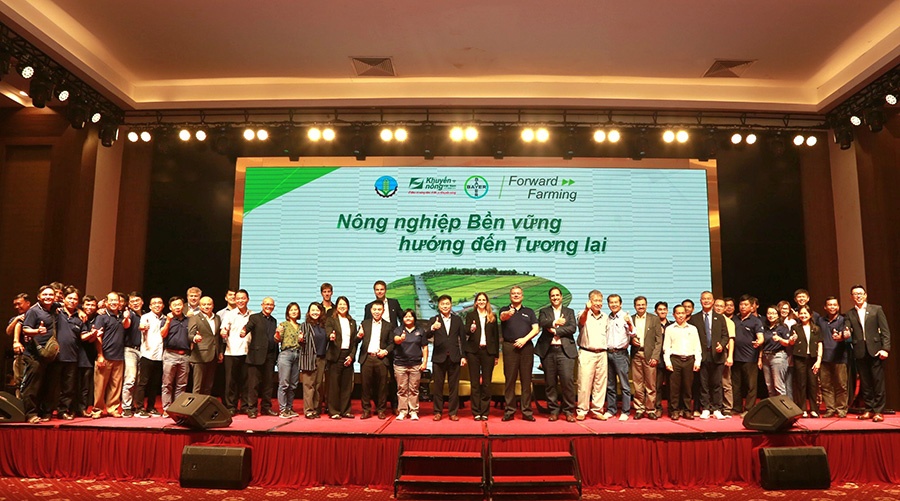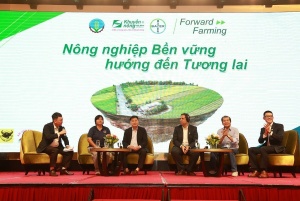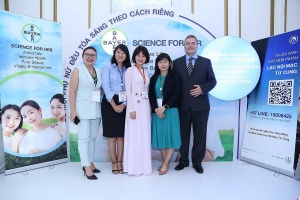Bayer’s sustainable agriculture efforts in Vietnam
The remarkable achievements are highlighted by its number one ranking in the agricultural inputs segment of the Nature and Biodiversity Benchmark, reflecting the company’s commitment to reducing environmental impact and promoting a nature-positive future.
Companies were evaluated and ranked based on their efforts to align with the United Nations’ Sustainable Development Goals and make positive contributions to addressing global challenges.
 |
World-leading agriculture company Bayer is committed to delivering the best possible outcomes for farmers and the food system while at the same time minimising agriculture’s impact on the planet. The company has made ambitious commitments as the first step of its journey towards a healthier and more sustainable future.
By 2030, Bayer will minimise the climate footprint of farming, helping farming customers reduce their field greenhouse gas footprint by 30 per cent. The company also aims to reach 100 million smallholder farmers in low- and middle-income countries in that time, providing access to agronomic education and unique products and partnerships, and leading to improved incomes and better lives.
To make progress towards sustainable goals in the agriculture sector, Bayer has formulated and executed numerous internal initiatives as well as collaborative programmes involving external stakeholders.
Externally, the company strives to support growers’ transition to regenerative agriculture, an outcome-based model focused on soil health, resilience, and other key goals. These include mitigating climate change by reducing emissions and boosting carbon removal, maintaining biodiversity, conserving water resources, and improving yields, economic conditions, and social wellbeing for farmers and their communities.
At the same time, it has invested efforts to educate farmers on the conscious and responsible application of crop protection products (ensuring they are used strictly in accordance with their intended purposes and labelled applications) to maximise benefits while minimising health, safety, and environmental risks.
In addition, Bayer is taking extra care to train landowners on prudent use and the utilisation of personal protective equipment to ensure their own safety.
Its recently launched ForwardFarming initiative in Vietnam serves as a prime example of efforts to promote and facilitate the agricultural sector’s transition towards regenerative practices.
In the initial first rice season, the three-year project demonstrated positive outcomes from applying smart agricultural solutions. There were remarkable increases in farm yield by 13 per cent and in the ratio of profit versus income of farmers by 46 per cent compared to common practices. This sat alongside reductions in cultivation inputs including seed, herbicide, fertiliser and workload of farmers.
As part of this project, extensive training was provided to 2,000 farmers on product stewardship and rice farming solutions to promote safe use of crop protection products and reduce emissions in rice cultivation. Of which, 500 female farmers received training on health topics to enable better management of their own and families’ wellbeing, recognising women’s pivotal roles in agriculture and in the community.
While working with farmers and along the value chain helps to limit emissions upstream and downstream, Bayer is also making commitments to adjust its internal ways of working. The company set a target of reducing emissions from power plants, vehicles, production facilities, and indirect emissions from procurement of electricity, steam, and cooling energy by 42 per cent by 2030.
 | Bayer initiative embracing sustainable agriculture Bayer Vietnam has stepped up sustainability efforts by launching its ForwardFarm initiative in Vietnam to promote the development of agriculture. |
 | Bayer launches Science for Her campaign to raise awareness of women's healthcare Bayer has kicked off the Science for Her campaign in Vietnam to improve awareness and boost knowledge about women's healthcare. |
 | Bayer leveraging digital models to enhance healthcare The percentage of the world’s population over age 60 is predicted to reach almost 22 per cent by 2050 – almost double the percentage reported in 2015. The impact of the demographic shift to an ageing and growing population is being felt across society and industries. |
What the stars mean:
★ Poor ★ ★ Promising ★★★ Good ★★★★ Very good ★★★★★ Exceptional
Related Contents
Latest News
More News
- Masan Consumer names new deputy CEO to drive foods and beverages growth (February 23, 2026 | 20:52)
- Myriad risks ahead, but ones Vietnam can confront (February 20, 2026 | 15:02)
- Vietnam making the leap into AI and semiconductors (February 20, 2026 | 09:37)
- Funding must be activated for semiconductor success (February 20, 2026 | 09:20)
- Resilience as new benchmark for smarter infrastructure (February 19, 2026 | 20:35)
- A golden time to shine within ASEAN (February 19, 2026 | 20:22)
- Vietnam’s pivotal year for advancing sustainability (February 19, 2026 | 08:44)
- Strengthening the core role of industry and trade (February 19, 2026 | 08:35)
- Future orientations for healthcare improvements (February 19, 2026 | 08:29)
- Infrastructure orientations suitable for a new chapter (February 19, 2026 | 08:15)

 Tag:
Tag:


















 Mobile Version
Mobile Version